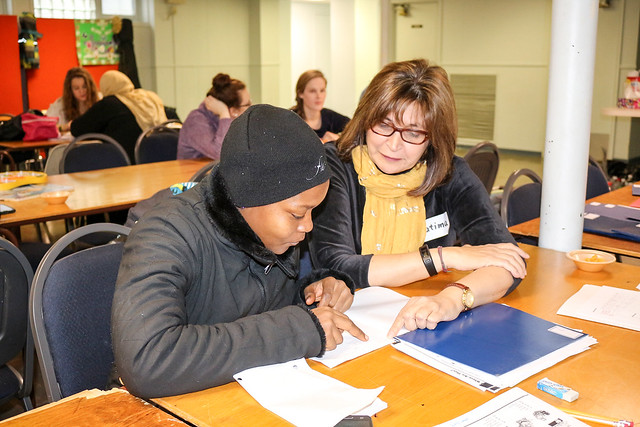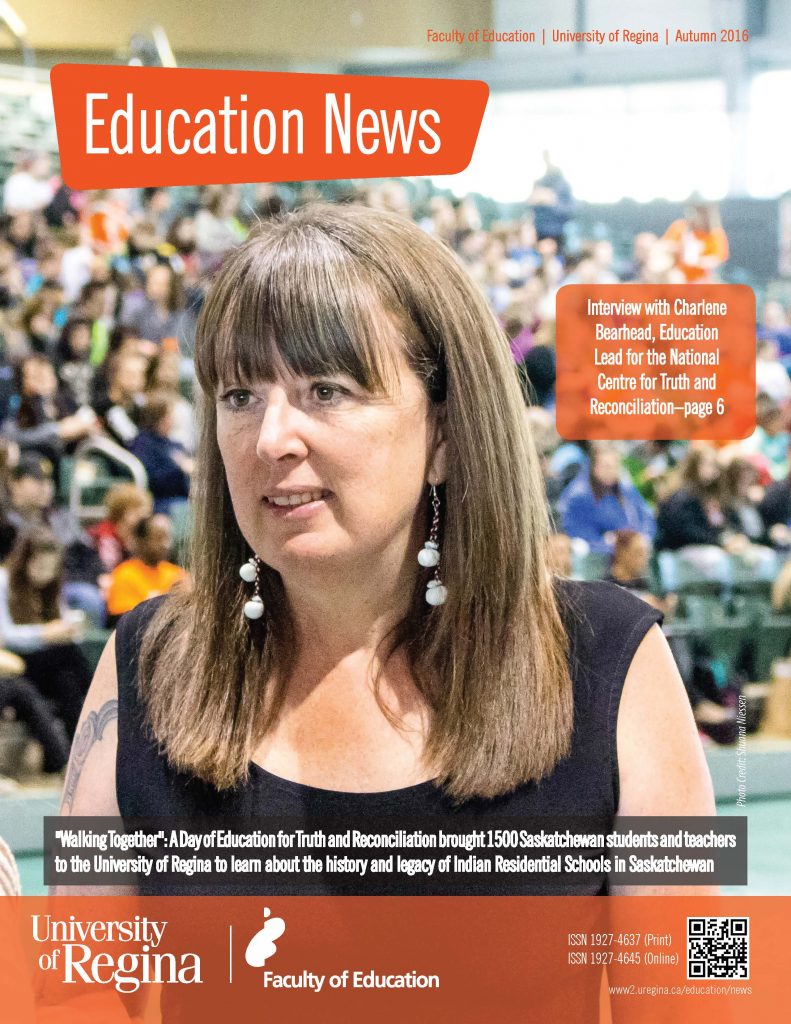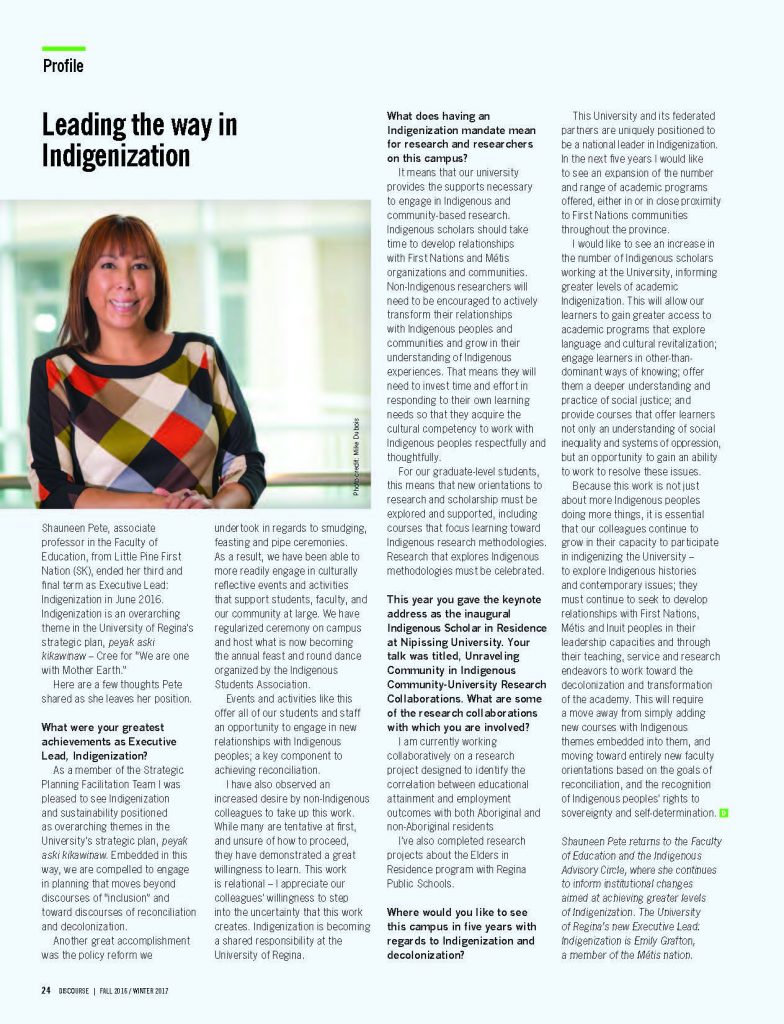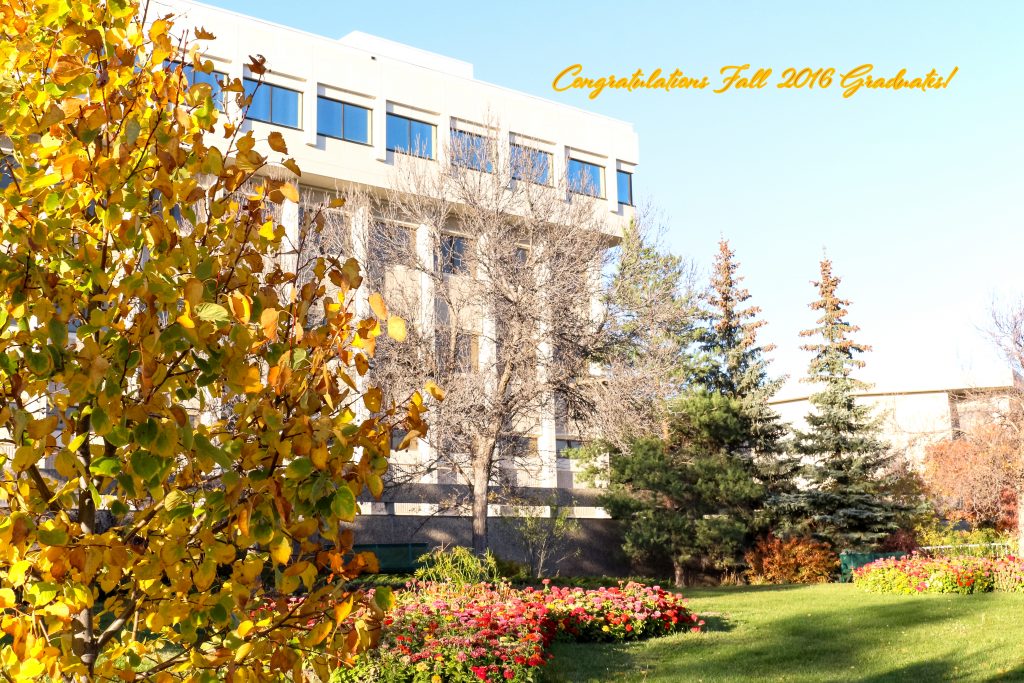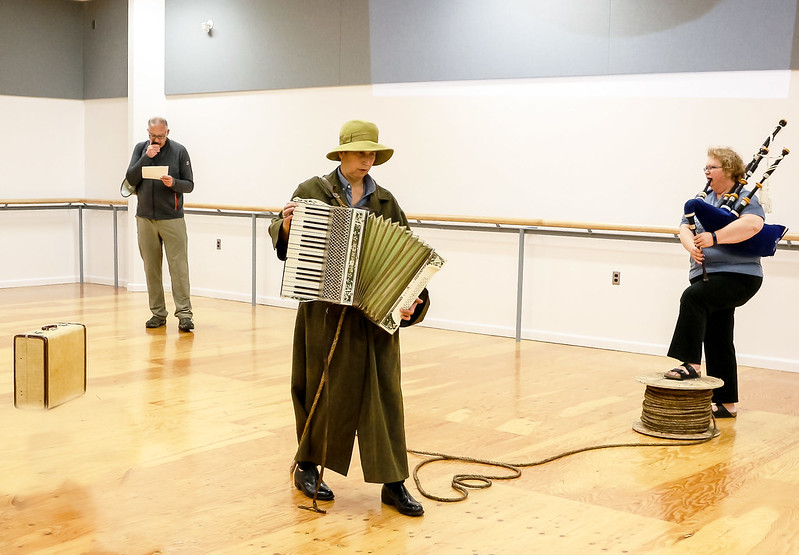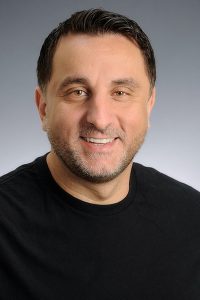 Congratulations to Dr. Alec Couros, an international leader in educational technology, digital literacy, and social media, who was honored on November 3 by MindShare Learning with the EdTech Leader of the Year (Post Secondary) award. The announcement was made at the 7th Canadian EdTech Leadership Summit in Toronto. MindShare Learning aims to transform learning in the 21st century through innovative educational practices in and beyond Canada.
Congratulations to Dr. Alec Couros, an international leader in educational technology, digital literacy, and social media, who was honored on November 3 by MindShare Learning with the EdTech Leader of the Year (Post Secondary) award. The announcement was made at the 7th Canadian EdTech Leadership Summit in Toronto. MindShare Learning aims to transform learning in the 21st century through innovative educational practices in and beyond Canada.
Read about at http://summit16.mindsharelearning.ca MindShare Learning .
Author: Editor Ed News
Celeste Snowber | Earth Traces: Reclaiming Armenian Identity Through Poetry and Dance
Celeste Snowber | Earth Traces: Reclaiming Armenian Identity Through Poetry and Dance
Theory and Method Seminar
November 2, 2016
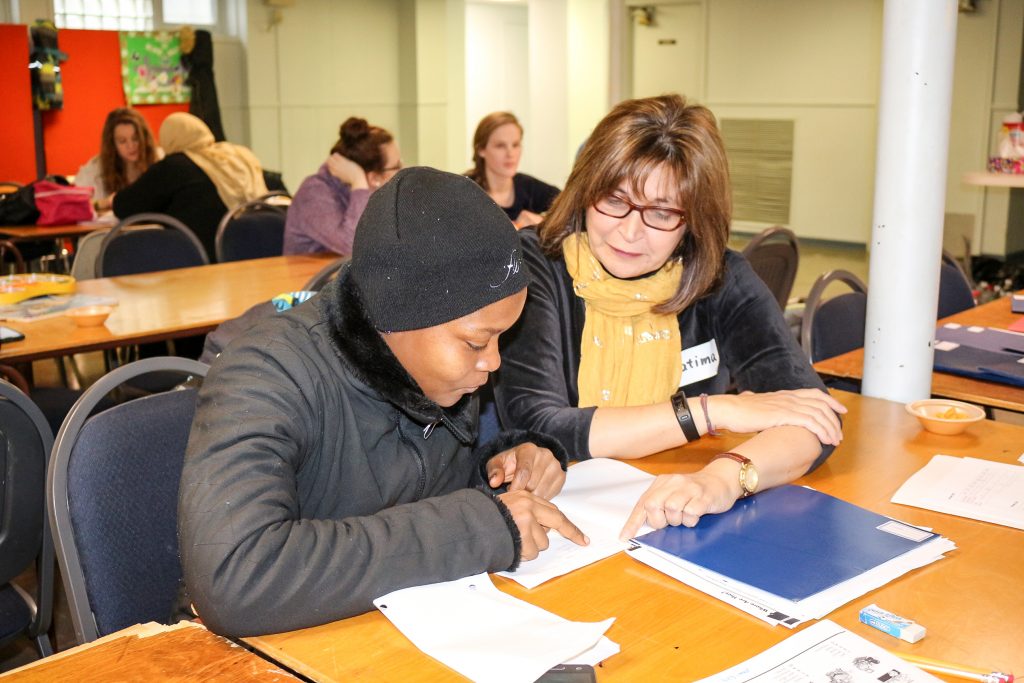
Students Volunteer in Language Program for New Canadian Women
ELNG 200 students are volunteering in a community-based language program for new Canadian women with infants and preschool-aged children. The program was developed by the Faculty of Education’s Dr. Fatima Pirbhai-Illich and Professor Emeritus Dr. Meredith Cherland in partnership with the Saskatchewan Synod of the Evangelical Lutheran Church in Canada (ELCIC).
ELNG 200 is a second-year Faculty of Education course that prepares future teachers to support students learning to speak, read, and write the English language. As part of the course requirements, students must be involved in 8-10 hours of critical service volunteering. However, with approximately 30 students per course looking to fulfil their volunteer requirements in teaching English as an additional language (EAL), this requirement can pose a difficulty. Dr. Fatima Pirbhai-Illich, who teaches the course, says, “Sometimes students are left scrambling.” Thus, she began looking for new venues where her students could volunteer.
Dr. Pirbhai-Illich approached a colleague, Professor Emeritus Dr. Meredith Cherland, about the needs of her students. Dr. Cherland, who is chair of the Welcoming the Newcomer Committee for her church, Our Savior’s Lutheran Church in Regina, had been working with the committee, filling out federal forms of application for sponsoring a Syrian family of six. The committee was aware that the process would take several more months and they were asking themselves what to do in the meantime.
Meredith had met 18-year-old Finda Sam, her husband Amos Kamato, and their baby boy at church. Meredith says, “The couple had spent many years of their young lives in a refugee camp in Guinea, although they were born in Sierra Leone. Their first language is Kisi, an African language I had never heard of.” Finda had approached Meredith, asking if she could help her to learn to speak English better, and to learn to read and write English. Finda was waiting for a childcare opening before she could begin English classes at the Open Door Society. “The classes at Open Door and the Library have a limited number of spaces and there are wait lists,” says Meredith.
With Finda’s situation in mind, Meredith and Fatima started thinking about the many new Canadian women in Regina who could not attend EAL classes because they had babies or preschoolers to care for. They began working to set up a community-based language program for newcomers to Canada, specifically those who are on waiting lists for language classes through the Open Door Society, the Regina Public Library, and the Regina Immigrant Women’s Centre. Fatima with her extensive EAL background was willing to teach a language and literacy class for newcomer women with babies or preschoolers on Tuesday and Friday mornings. This would also give her U of R ELNG 200 students opportunities for volunteering.
Thus resolved, Fatima and Meredith began looking for a space, and were at first discouraged because they had no budget. Meredith, then, applied to the Saskatchewan Synod of the Evangelical Lutheran Church in Canada (ELCIC) for funding. The ELCIC awarded them $1,100.
Central Lutheran Church offered them space without charge. “This is the most important part,” says Fatima, “It’s amazing, and we wouldn’t have been able to offer the program without it.”
The funding, then, would cover tea, juice, and snacks for the students and their children and the services of a coordinator. Cynthia Schultz, a University of Regina master’s student in the Faculty of Education, was hired as the coordinator.
With a space, a teacher, a coordinator and volunteers in place, they advertised the course at the Open Door Society, the Regina Public Library and the Lutheran churches in Regina. The first class was offered on October 4.
Coordinator Cynthia Schultz says, “So far, we have only held five classes, but we have had 11 women attend, with nine attending regularly, and about nine children under the age of five attending. Around seven students from Fatima’s class [ELNG 200] come on Tuesday mornings and nine on Fridays.”
Others from the Faculty are also involved. Dr. Christine Massing helps with the children on Tuesdays. The students from ELNG 200 and students from Fatima’s master’s classes have taken this opportunity to donate items such as diapers and clothing for the EAL students to take home. Yan Yang, a PhD student, also comes out to help tutor each week.
Some women from the Lutheran Church are also volunteering, helping with set up and bringing homemade halal snacks once per week. Bernice Casper, a volunteer from Our Savior’s Lutheran Church, says, “I think this is so wonderful for new Canadians to have this opportunity to learn English one-on-one—it’s one-on-one—that’s what I want to emphasize about this program. I also love the interactions between the U of R students and the English students.”
Fatima prepares all the course material after assessing where EAL students are at with their English. She also assists her ELNG 200 student volunteers with strategies for teaching EAL. The Regina Public Library has helped with curriculum.
EAL student Rasha has been attending the program for one month and says she likes it; “I’m learning many words,” she says. She is finding new friends through the program; “We help each other with English.”
University of Regina student Jenna Magnusson works with Rasha as her EAL tutor. Jenna says, “This has been a good experience. I’m gaining insights about people learning English.” One of her strategies is to use her Google translator to look up a word in Arabic when her student gets stuck on a word.
EAL student Finda Sam works with U of R student Jonah Norman-Gray. Finda also likes the program and says she is learning. She says, “I want to learn to read, to read and write.” She would also like to learn to drive. Once these skills are in place, she will consider what she would like to do in the future.
What has volunteering taught him? Jonah says, “Awkwardness [when teaching EAL] is not a problem. Situations where you are not sure what to say are normal. Awkwardness just means you care about the situation.” Working as a volunteer in this program is important to Jonah because, he says, “I will be using this [experience] in the future–I think it is very important work.” Jonah adds, “It is good to see this kind of program show up in a grass-roots scenario. This is beautiful–it is the goodness of people.”
Miriam, a mother of four, has also found the program helpful. She says, “Everyone helps me learn English.” She has also found new friendships through the program. U of R students Taylor Raby and Darian Kaszas work together with Miriam using a picture dictionary. Speaking to the value of this experience, Darian says the program “will help a lot for future educators. We are bound to have students who don’t speak English,” and Taylor adds, “or students who are trying to learn another language.” Taylor says she has learned that when teaching EAL, “it really helps if you go slowly and repeat a lot.”
Cynthia Schultz focuses on the value of this program for the EAL students. She says, “For me, I see the importance of these classes for the women who attend. They are no longer at home all day by themselves or only with their young children. They come to us for four hours per week, they get to socialize with other women, and of course, they learn a variety of English language and literacy skills. On the first day, everyone was shy, but now they come in and you can see that they are excited to be here…I have noticed their language skills becoming much stronger and it is wonderful to see.”
For the future, Fatima is interested in making this program a self-sustaining model: She says, “It is for community from community.” She is hoping to interest retired teachers in the program, and more student volunteers.
Meredith says, “Things have been going well, and we will try to continue as long as there is a need. The Faculty of Education and its students are truly in partnership with the ELCIC on this project. The church is providing space to meet, funds to keep us going, and people to help. The Faculty is providing a teacher, and students to provide one-on-one tutoring, practice with English, and friendship. The project is only one thing our church is doing to help refugees, and only one thing the Faculty of Education is doing to respond to the world around us and its educational needs. It seems to me that God is calling us all to contribute. There are, after all, 21 million refugees in the world today, according to the United Nations.”
To see photo gallery, slide your cursor over the photo below and click on the arrow to see the next photo.
Autumn Issue | Education News
Leading the Way in Indigenization
Congratulations Fall 2016 Graduates!
SAFE Conference Keynote
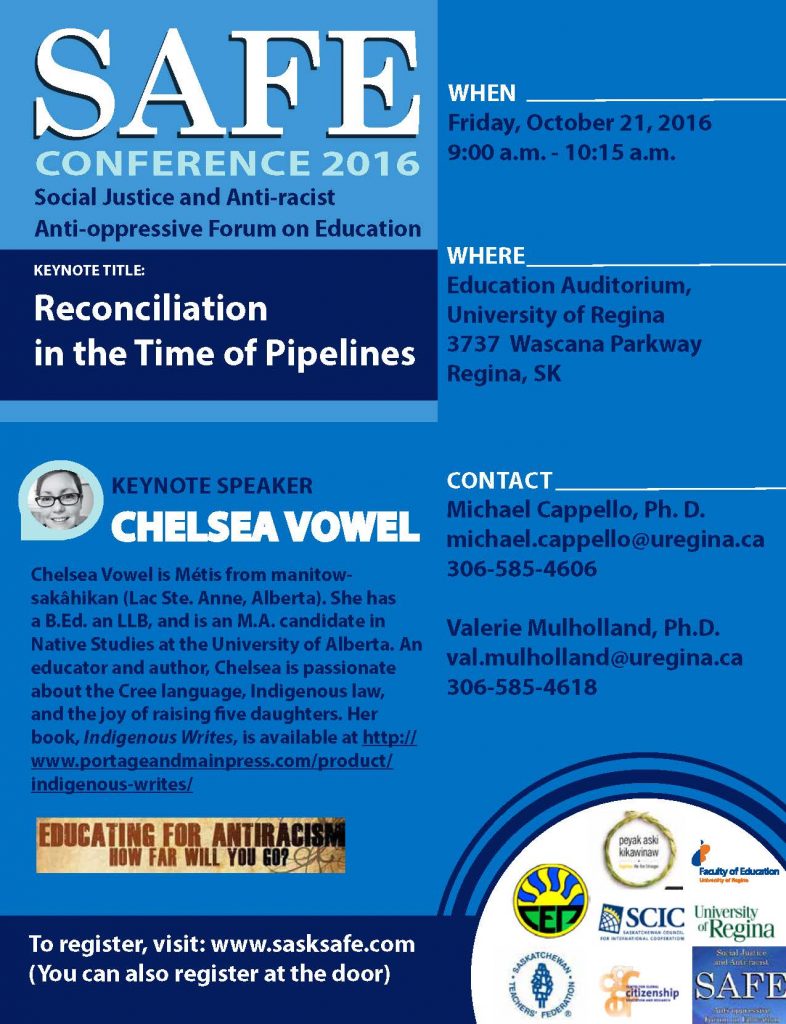 See https://www.sasksafe.com/ for Conference schedule (Conference Dates: Oct 21-22, 2016
See https://www.sasksafe.com/ for Conference schedule (Conference Dates: Oct 21-22, 2016
Location: Faculty of Education, University of Regina)
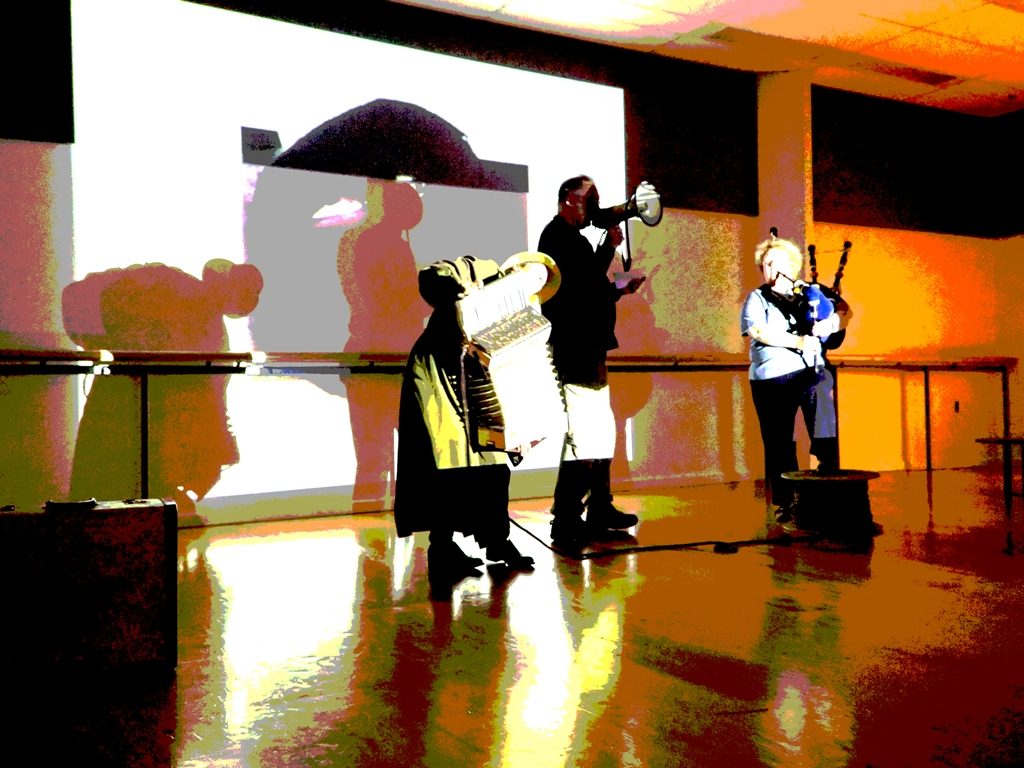
Rehearsing for MAG’s Meet in the Middle Symposium
Dr. Kathryn Ricketts (dance/accordian) and Dr. Gale Russell (bagpipes) with Ian Campbell (media artist) and Ken Wilson (speaker) rehearsing for the “Meet in the Middle | Stations of Migration and Memory Between Art and Film Symposium” that will be held at Mackenzie Art Gallery Nov. 2-5. They will perform Lucky’s Performance Bricolage, an excerpt from Samuel Beckett’s Waiting for Godot, on November 4 at 4:15–4:45 p.m. There will be a workshop after the performance for anyone wanting to participate.
From the Symposium Programme: Kathryn Ricketts will perform a particular rendering of Lucky’s monologue from Samuel Beckett’s Waiting for Godot. This structured improvisation will hinge on fractured text from the play through her unique performative style, folding dance, theatre and voice into a poetic collage of moving images supported by a media artist and bag piper. In the context of the symposium, performer and audience move from Waiting for Godot to notions of liminality and migration and finally to the idea of meeting in the middle from disparate locations.
Research Funding News
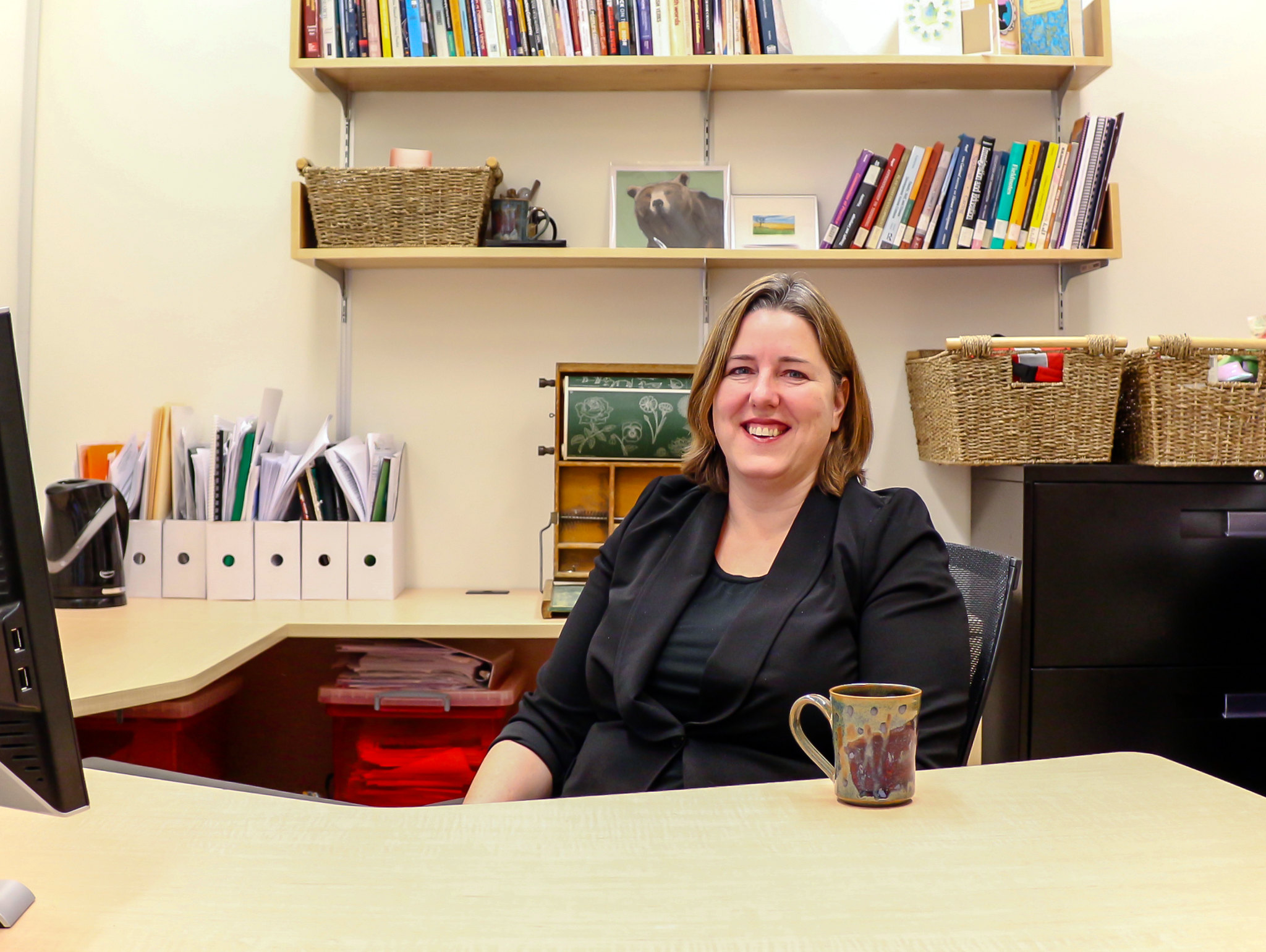
Dr. Christine Massing (Faculty of Education), Dr. Daniel Kikulwe and Dr. Donalda Halabuzu (Faculty of Social Work) and Crystal Geisbrecht (PATHS) have signed a research contract with the Regina Region Local Immigration Partnership in the amount of $19,963.80 for the project “Barriers to Newcomer Adaptation and Settlement.” Needal Ghadi, a doctoral student in the Faculty of Education, will be the research assistant.
The mixed methods study will determine barriers and possible supports that may hinder or aid newcomers in adapting to life in Regina. More specifically, the barriers to accessing child care, education, and employment opportunities will be studied. This is a very timely study in light of the dramatic increase in newcomers to Regina in the last five years. No doubt it will make an important contribution to improving newcomer experiences in many aspects of their lives.
Christine says, “I’m looking forward to being part of this important community service project. We hope to engage with newcomers to Canada and learn about their experiences as they adapt to living here in Regina. Our goal is to gain an understanding of the barriers they have experienced as they try to access child care programs, as well as educational and employment opportunities.”
Theory and Method Seminar ~ Video October 12, 2016
Theory and Method Seminar ~ Video October 12, 2016
Dr. JoLee Sasakamoose | Indigenous Cultural Responsivity Theory
